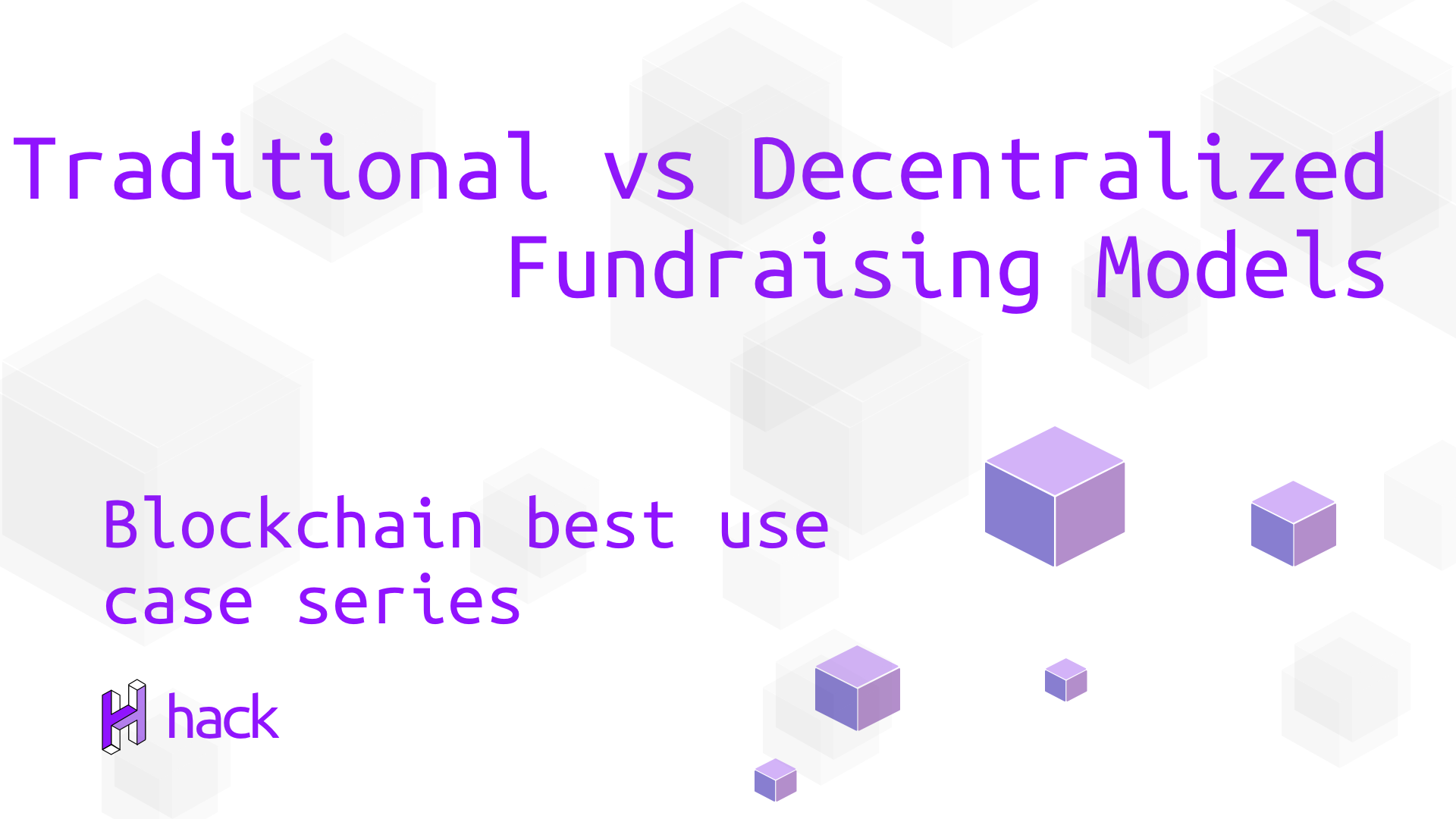Fundraising has been occurring for as long as people have been using money to conduct business. Over thousands of years, the options available have expanded from self-funding and peer-to-peer loans, to what we now call angel investors, bank loans, government grants, and internet-based crowdfunding. Raising capital is hard, even if your startup has high-profit margins and strong growth. In the best-case scenario, you secure financing after a month-long marathon of wooing investors, talking to banks, and collating reams of paperwork. But more likely, your months of hard work will leave you empty-handed.
In recent years, a new option – blockchain-based funding – has arisen that may change the way we know fundraising. In this article we will look at traditional fundraising options and blockchain-based crowdfunding, comparing their potential and highlighting the benefits and drawbacks of each.
Traditional Fundraising:
- Bank Loans
A lot of startups earn a bank’s stamp of approval because of a metric that matters a lot to bankers and not at all to the company: the founder’s personal credit score. Banks are still stuck in the days of inventory and asset-heavy businesses, back when real estate was still a safe investment. We have to say that these loans are a time-honored and reliable method of financing a small business, but banks often only finance firms with substantial collateral and a long track record, and the terms they offer are often very strict.

We still have to mention the advantages bank loans have like the predictable monthly payments and that banks do not take any ownership position or get involved in any aspect of running the business, but business owners should weigh the advantages and disadvantages of bank loans against other means of finance.
- Venture Capitalists
A venture capitalist (VC) is a private equity investor that provides capital to companies exhibiting high growth potential in exchange for an equity stake. This could be funding startup ventures or supporting small companies that wish to expand but do not have access to equities markets. Venture capitalists are willing to risk investing in such companies because they can earn a massive return on their investments if these companies are a success.
The big pro about venture capitalists is that the money is yours to keep. VC and angel investors are basically gambling on the business. If it succeeds, they win big; if it fails, they eat their losses. Unlike a bank loan, you have no obligation to repay VC funds. If you go under, you won’t have investor debt hanging over your head. But even though you don’t need to repay VC funds, the money comes with strings attached. Investors give you money in exchange for an equity share in your company. This dilutes the number of shares you hold and can offer future shareholders. Depending on the number of shares granted, you may be giving investors the right to make controlling decisions about your company.
- Crowdfunding platforms
Crowdfunding has become an increasingly popular way for individuals and businesses alike to raise much-needed capital ever since platforms like Kickstarter and Indiegogo emerged on the scene about a decade ago. One of the biggest advantages of hosting a fundraiser on a funding portal is that you can concentrate all of your investor discussion into a single place and allows creators to test the initial market of early adopters before transitioning their product onto the actual market. Crowdfunding is a phenomenal way to test the market without building out a full website or a company. In other words, it enables you to test the waters to see whether your idea has merit without taking on a ton of financial risk.
Scammers are by far the biggest con of the crowdfunding space as there are many projects that have a successful raise but do not pull through with the execution of the project. This reduces the trust between creators and early adopters. Startups must also be aware that crowdfunding doesn’t work for all businesses. It is targeted at more “consumer-facing” products like a watch or a game, but it most likely won’t raise capital if you want to start a catering company.
Decentralized Fundraising:

- ICOs
Initial Coin Offerings (ICOs) is a popular fundraising method used primarily by startups wishing to offer products and services, usually related to the cryptocurrency and blockchain space.
Unlike VC where investors are allowed to purchase company stocks that have value in the form of percentages or shares, ICOs provide investors with the opportunity to purchase coins of their own brand of digital currency as compensation. In other words, startups create a document essentially detailing exactly how their idea would work (usually called a white paper), and explain why it’s a great project that could be very useful. Then, you ask for people to send you money (usually Bitcoin or Ether) and in return, you send them back some of your own tokens with the hope that those tokens will get used a lot and be in high circulation, which would raise the value of the currency.
The primary advantage of an ICO is that all the transactions are done online. Everything can be easily investigated and traced online. What makes ICOs more attractive than traditional fundraising is that they rely on blockchain technology to keep track of the transactions which doesn’t require unnecessary paperwork that more or less can take up time and energy. The big con is that many ICOs don’t undergo regulatory processes as the traditional fundraising methods, making them subject to malicious practices, which more or less can enable illegal companies to extract money from vulnerable investors.
- IEOs
An initial exchange offering (IEO) is a crowdfunding strategy that is an alternative to the already known initial coin offerings (ICOs). In an IEO, the tokens are administered by a cryptocurrency exchange on behalf of the startup and not by the startup itself and it’s the crypto exchanges that raise funds. One of the key benefits of IEOs is the fact that they’re carried out with the help of a third party: the crypto exchange platform. The platform will screen every project that seeks to launch an IEO on its site. Exchanges want to maintain a good reputation and they choose token issuers carefully. That’s how they eliminate potential scam projects from raising funds. Any startup looking to issue tokens can take advantage of the processes on platforms and it will help them with marketing and streamlining the entire process. Another advantage of an IEO is that the token is immediately available for trading. After all, the token distribution and sale are done via an exchange, and practice shows that the token becomes available for trading within a week, while ICO’s can sometimes take up to months. And there are even a lot of cases where the token doesn’t even get exchange.
The main disadvantage of IEOs comes at the price of listings and the cost associated with token sales can turn out to be quite high for startups.
- STOs
Security Token Offerings (STOs) are created and issued by a company looking to raise money. STOs, however, are similar to more traditional securities as they are backed by real assets – whether equity, debts/loans, or investment funds. STOs are a better choice for businesses looking to raise capital but don’t have a suitable platform for utility tokens. That’s because the value of security tokens is based on the value of the company or underlying asset, rather than on-demand driven by platform use. A major benefit of an STO is that it can be used to tokenize any asset relatively easily for trading online, which means that smaller, early-stage businesses can raise large amounts of capital quickly without needing to pay huge fees. Furthermore, security tokens allow you to divide underlying assets into smaller units, enabling fractional ownership, which makes it more affordable for some investors to contribute to your business. Another great advantage is that security tokens provide investors with more liquidity. Since there are thousands of investors locked into long-term investments in which they must wait until the maturity date to access their funds, it leaves these individuals without access to their money for years. Security tokens can eliminate these concerns. Once a fund is tokenized, an investor can buy and sell fund shares as they see fit. This produces a more effective flow of assets and enables the development of secondary trading platforms to handle new market opportunities.
One of the biggest drawbacks to security tokens is the inability of non-accredited investors to own them. Another con is the secondary trading market restrictions. Security tokens can only be transferred via licensed platforms. The platforms must possess a security trading license in the country they operate in.
- DAOs
DAO is an organization that was designed as a form of venture capital fund that is automated, decentralized, and based on open-source code without a typical management structure or board of directors. The idea behind this organization is to eliminate the human error or manipulation of investor funds by placing decision-making power into the hands of an automated system and a crowdsourced process. Basically, DAO is the intermediary between startups and their investors but instead of a legal body, they have smart contracts, instead of bank accounts they use cryptocurrencies, and instead of the jurisdiction, they have a borderless blockchain network.
The very essence of DAO is that it was designed to allow investors to send money from anywhere in the world anonymously and it would then provide those owners tokens, allowing them voting rights in the decision making on possible projects.
Besides all that, Fundraising DAOs have many benefits for both investors and startups such as transparency in business relations, lowering the risks of manipulation, easy communications, decentralized decision making, and of course complete independence.
Conclusion
As seen in the article, blockchain fundraising has a number of benefits over traditional methods. Some include automation, speed, efficiency, fractionalization, liquidity, and flexibility leading to advantages as greater cost savings, opening up the potential for investors on a much wider and global level, and making the transfer processes faster, simpler, and more efficient.
Whilst there is a space for many traditional fundraising options – whether crowdfunding for a small project or partnering with angel investors for both funding and advice, the benefits of blockchain-based crowdfunding are enormous and will likely take over from many traditional fundraising options in the future.
The purpose of this article is to highlight and compare the potentials of both fundraising models and has no intention of giving financial advice.
Stay tuned for our next article piece about the Blockchain world & Subscribe to our newsletter.



